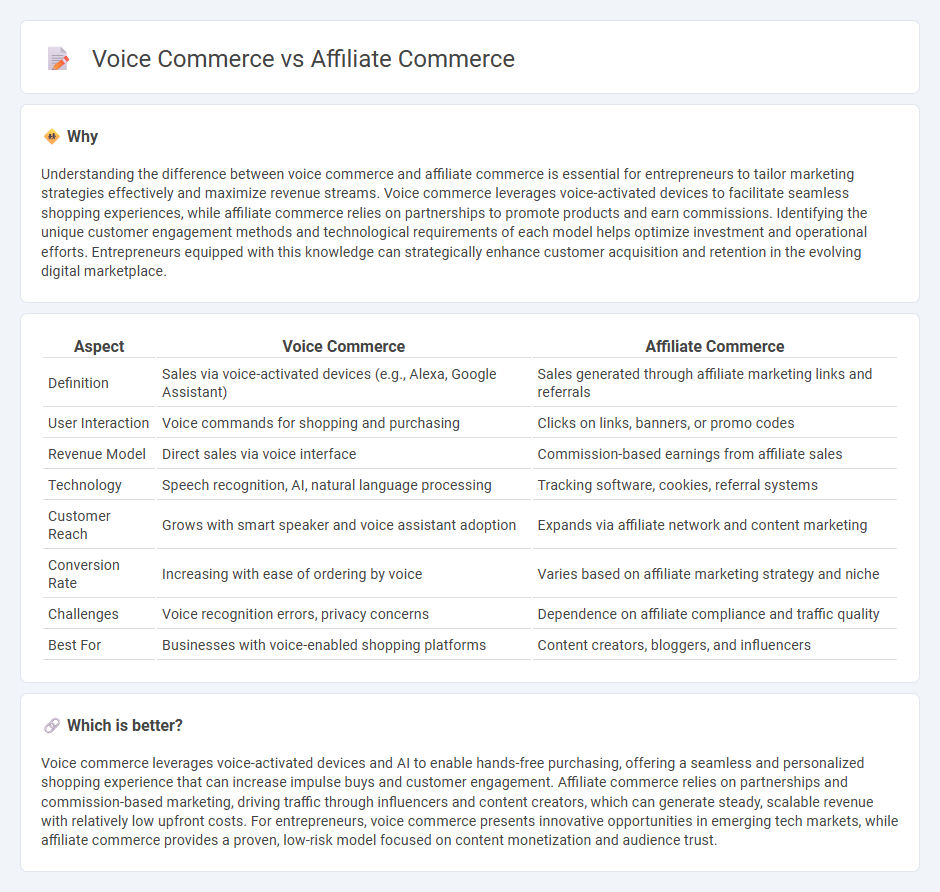
Voice commerce leverages voice-activated devices to enable seamless shopping experiences, enhancing customer convenience and engagement. Affiliate commerce drives sales through partnerships where affiliates earn commissions by promoting products, expanding market reach effectively. Explore the key differences between voice commerce and affiliate commerce to optimize your entrepreneurial strategy.
Why it is important
Understanding the difference between voice commerce and affiliate commerce is essential for entrepreneurs to tailor marketing strategies effectively and maximize revenue streams. Voice commerce leverages voice-activated devices to facilitate seamless shopping experiences, while affiliate commerce relies on partnerships to promote products and earn commissions. Identifying the unique customer engagement methods and technological requirements of each model helps optimize investment and operational efforts. Entrepreneurs equipped with this knowledge can strategically enhance customer acquisition and retention in the evolving digital marketplace.
Comparison Table
| Aspect | Voice Commerce | Affiliate Commerce |
|---|---|---|
| Definition | Sales via voice-activated devices (e.g., Alexa, Google Assistant) | Sales generated through affiliate marketing links and referrals |
| User Interaction | Voice commands for shopping and purchasing | Clicks on links, banners, or promo codes |
| Revenue Model | Direct sales via voice interface | Commission-based earnings from affiliate sales |
| Technology | Speech recognition, AI, natural language processing | Tracking software, cookies, referral systems |
| Customer Reach | Grows with smart speaker and voice assistant adoption | Expands via affiliate network and content marketing |
| Conversion Rate | Increasing with ease of ordering by voice | Varies based on affiliate marketing strategy and niche |
| Challenges | Voice recognition errors, privacy concerns | Dependence on affiliate compliance and traffic quality |
| Best For | Businesses with voice-enabled shopping platforms | Content creators, bloggers, and influencers |
Which is better?
Voice commerce leverages voice-activated devices and AI to enable hands-free purchasing, offering a seamless and personalized shopping experience that can increase impulse buys and customer engagement. Affiliate commerce relies on partnerships and commission-based marketing, driving traffic through influencers and content creators, which can generate steady, scalable revenue with relatively low upfront costs. For entrepreneurs, voice commerce presents innovative opportunities in emerging tech markets, while affiliate commerce provides a proven, low-risk model focused on content monetization and audience trust.
Connection
Voice commerce leverages voice-activated technology to facilitate seamless purchasing experiences, while affiliate commerce drives sales through partnerships promoting products or services. Entrepreneurs integrate voice commerce platforms with affiliate marketing strategies to enhance user engagement and trackable revenue streams. This connection enables direction of voice-driven consumers to affiliate links, optimizing conversion rates and expanding market reach.
Key Terms
Revenue Sharing
Affiliate commerce generates revenue by sharing commissions with affiliates who drive sales through their marketing efforts, often resulting in a performance-based revenue model. Voice commerce leverages voice-activated devices to facilitate purchases, sharing revenue through partnerships with platforms like Amazon Alexa or Google Assistant, emphasizing seamless customer interactions and convenience. Explore the evolving dynamics of revenue sharing in these innovative commerce models to maximize your business growth.
Conversational AI
Affiliate commerce leverages conversational AI by integrating AI-driven product recommendations within chat interfaces to enhance user engagement and increase conversion rates. Voice commerce utilizes voice-activated assistants powered by conversational AI to facilitate seamless, hands-free shopping experiences through natural language processing and personalized responses. Explore the evolving impact of conversational AI on these commerce models to optimize customer interaction strategies.
Referral Tracking
Affiliate commerce leverages referral tracking to attribute sales accurately to specific affiliates through unique links or codes, enabling precise commission payouts and performance analysis. Voice commerce, integrated with smart assistants like Alexa or Google Assistant, utilizes voice-activated referral tracking systems to connect purchases with corresponding referrals seamlessly. Explore how these referral tracking methods enhance conversion rates and customer engagement in modern commerce.
Source and External Links
Affiliate Programs: A Step-by-Step Guide for Ecommerce - Affiliate commerce involves a partnership where an advertiser (online store owner) pays a commission to an affiliate (publisher) for marketing products and generating sales, benefiting both as the advertiser gains sales and affiliates monetize their influence.
Affiliate Marketing Guide: All You Need To Know (2025) - Affiliates earn money through various models like revenue sharing (commission per sale), cost per action, cost per install, subscription commissions, hybrid, or tiered commissions, with payment typically triggered by sales or specific user actions.
Affiliate Marketing 101: What it is and How to Get Started - Affiliate commerce relies on three parties: seller/product creator, affiliate/publisher, and consumer, where the affiliate promotes the seller's products and earns a commission on resulting sales, allowing sellers to expand their audience with shared profit incentives.
 dowidth.com
dowidth.com